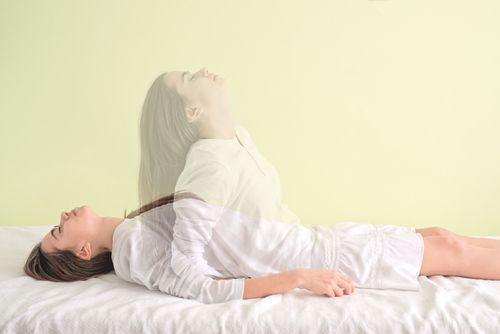Woman Believes Her Willful 'Out-Of-Body' Experiences Are Totally Normal: Are They?

Many of us have sat around a camp fire and heard the stories and legends of astral projection, or out-of-body experiences. The idea of floating and rotating horizontally in the air above your physical body seems unreal and straight out an episode of the Twilight Zone, but current research suggests it may be more common than previously thought. According to a study in the journal Frontiers in Human Neuroscience, scientists described a case of a 24-year-old psychology student at the University of Ottawa who allegedly can have out-of-body experiences at will since childhood.
“I feel myself moving, or, more accurately, can make myself feel as if I am moving. I know perfectly well that I am not actually moving,” the student told the researchers. “In fact, I am hyper-sensitive to my body at that point, because I am concentrating so hard on the sensation of moving. ... For example, if I ‘spin’ for long enough, I get dizzy.” Moreover, the 24-year-old admitted the thought of being able to float outside her body was normal since her days at preschool — where it was used as a distraction when she was asked to nap.
Intrigued by the psychology student’s claims, a team of researchers at the University of Ottawa decided to have her undergo functional magnetic resonance imaging (fMRI) to see if her brain activity could provide a clue to her unusual ability. The researchers asked the student to respond to four questionnaires: the Pittsburgh Sleep Quality Index, used to detect sleep disturbances associated with altered somatosensory or vestibular perceptions; the 8-item Movement Imagery Questionnaire-Revised; the 20-item Kinesthetic and Visual Imagery Questionnaire, used to estimate visual and kinesthetic imagery; and the PAS perceptual aberration scale, to study the reliability and validity of the psychosis-proneness. All of the data was collected during one imaging session.
The findings revealed the participant’s extra-corporeal experience involved a “strong deactivation of the visual cortex,” Popular Science reported. Her out-of-body experience also activated the left side of several areas of the brain associated with kinesthetic imagery. Andra M. Smith and Claude Messier, researchers of the study, believe this is what may cause mental representations of bodily movement. “It is interesting that the development of the participant’s ability was associated with delayed sleep onset in childhood (which persisted in adulthood) because the occurrence of out-of-body experiences has been frequently associated with hypnagogic phenomena” — a peculiar sensory experience that marks the onset of sleep, they wrote.
This specific case raised a question among the scientists of whether these experiences could be more common than thought, or if people can only have the ability if they practice this during childhood. This case study may add credibility to the estimated 10 percent of 300 million Americans who have lived a true out-of-body experience, the study reports. Currently there are two explanations to these personal experiences: The human consciousness is separating from the human body and traveling in a discorporate form in the physical world, or that they are hallucinations, according to The Lucidity Institute.
Interestingly, throughout the report, the word “hallucination” was used to describe the participant’s claims. However, there has yet to be an explanation as to why so many people have the same delusion if out-of-body experiences are considered to be a hallucination. In addition, the psychology student’s degree of detail is arguably very descriptive, which could put it outside the realm of fictional creation, says Rebecca Watson in a Popular Science blog post.
Whether out-of-body experiences are fact or fiction, or, normal or a hallucination, remains unknown. However, if studies, unlike the fMRI paper are done — as an experiment with a hypothesis — perhaps this could hold the answer to the phenomenon. Until then, skeptics will hold on to a lack of sufficient data, while believers will hold on to the small available data — such as this study.
Source: Messier C, Smith AM. Voluntary out-of-body experience: an fMRI study. Front. Hum. Neurosci. 2014.



























